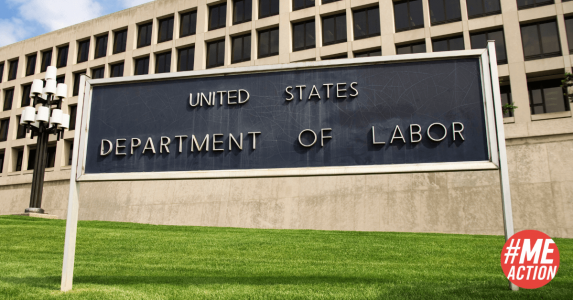#MEAction continues our advocacy for the #MillionsMissing in a recent meeting with the Office of Disability Employment Policy (ODEP) at the U.S. Department of Labor (DOL) where we presented on community issues affecting people with ME and Long COVID and offered policy recommendations that DOL can take to address them. President Biden’s Memorandum tasks DOL to cooperate in the government-wide response to Long COVID and associated conditions that is being led by the the Department of Health and Human Services.
#MEAction collaborated with representatives from Body Politic and Patient-Led Research Collaborative to develop briefing materials for DOL and sought input from attorneys with experience representing clients with ME/CFS and Long COVID.
We highlighted for ODEP the importance of getting workers and employers information on debilitating symptoms such as post-exertional malaise (PEM). U.S. Advocacy Director Ben HsuBorger and Body Politic board member Alison Sbrana shared from personal experience how a lack of understanding about how to manage PEM and access critical accommodations and benefits at the outset of their experience with chronic illness led to their health conditions worsening which further impaired their ability to work.
We urged ODEP to work with patient advocacy organizations to more widely disseminate information and resources to our communities. We also flagged for ODEP where they had been using outdated information on “chronic fatigue syndrome” that was not aligned with the CDC definition for ME/CFS and omitted vital information on managing PEM. We will share further information about our advocacy to ODEP and DOL as updates become available.
Sharing Your #MillionsMissing Story
Help us broaden the story our society tells around chronic illness and work by sharing your story. Together we can illustrate the connections—a common thread—that we all share in the barriers we’ve faced getting information on pacing, needed job accommodations, and access to disability benefits.
If we want to create policy change we need to share our stories of those who get sick and stay sick and whom are often hanging by a thread in our society, our institutions, and our healthcare systems. In order to get the recognition, treatment, and support for our complex chronic conditions, we have to first change the narrative.
Join us this #MillionsMissing for trainings and events that will prepare us to be better activists and storytellers- and make our impact last!





